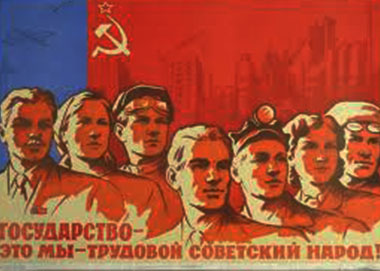Such attempts lead to hostility
Exactly 100 years ago, the Bolshevik leader Lenin wrote, “Socialism creates new and superior forms of human society, in which the legitimate needs and progressive aspirations of the working masses of each nationality will, for the first time, be met through international unity, provided existing national partitions are removed.” Based on this theory, from the 60s onwards, the phrase “Soviet people” in the country established by Lenin began to be used as an ideological term, stating that it is “a new historical generality,” in which the nations will merge maintaining some specificities.
In 1961, in the CPSU 22th Congress, Nikolai Khrushchev announced that this new form has a generality, “general socialist homeland – the Soviet Union, general economic foundation – socialist economy, general social-class structure, general outlook – Marxism-Leninism, general purpose – building communism, many general character traits in spiritual image and psychology.” The CPSU was announced to be the new general “driving force” of the “Soviet people”, and the contact language – Russian. Academician Yulian Bromley was elaborating the “scientific component” of this program.
Was demolition of “national partition” a utopia? Yes, but for the sake of it, the Soviet government has invested huge funds for propaganda and education, it has built a big and small cities with industrial giants. It was planned that these cities, particularly Yerevan, Gyumri, Kirovakan, Charentsavan and Abovyan, were to be inhabited not so much by Armenians, but by “Soviet people” with some general “spiritual image” and “psychology”. For us, Armenians, it was mostly acceptable, while, for example, for Estonians, it is too strange, and also for this reason, as well as followed by the purpose to make the industrial giants operating, thousands of Russians were sent to this country.
There was almost no resistance in Armenia to the idea of establishing “a new historical generality”. We, Armenian, as a rule, tend to be adaptable to “the higher-ups” ideas (if they do not touch our pocket), specifically not taking them serious and purely formally agreeing with them. Nevertheless, it should be noted that the idea of “new generality” is one of the moist important and necessary elements of the Soviet Empire ideology. Therewith, in fact, these programs are different from Putin’s Eurasian programs, which lack ideological and civilization foundations, and are even theoretically impracticable due to the absence of market relations, presence of Internet, totalitarian system and the “iron curtain”
In the second half of 80s, the theory of “removing national partitions” completely crushed in the Soviet Union. In later years, it was revealed that there are insurmountable contradictions not only between Armenians and Azerbaijanis, Chechens and Ingush, Uzbeks and Tajik, but also between the Ukrainian-speaking and Russian-speaking people. Today, hardly many people could be found in the post-Soviet territory who could feel them as particles of the “new generality”.
But it’s not just a problem emerged in our, the post-Soviet territory, but also in Europe, in particular. 40 years ago, we used to say, “Yugoslavian”, but now it is clear that there is no such nation, there are Serbs, Bosnians, Croats, Albanians and others who were destroying each other in the 1990s because of their contradictions. In Europe, the theory of “cultural diversity” also gave big cracks. The Turks in Germany “were not integrated” to European values and are great headaches for the Germans. A few years ago, we were not advised to walk in some streets at the evening hours in the center of Brussels to avoid the risk of attack by black people. Is it by chance that the nationalists have also raised in Europe?
Humanity has not found the keys to solving the national problem. I doubt that the universal and final solution to the problem will ever be found. One thing is clear: the ideas of creating “new historical generalities” are doomed. We should not make further attempts: it eventually leads to aggravation of contradictions between the nations. Nations should tolerate each other, compete with each other economically, and try to share the positive achievements. Excessive hugs result in breaking the nose to each other.
ARAM ABRAHAMYAN


















































